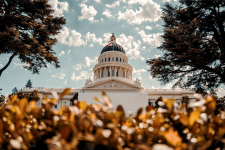Saturday, October 14 is the deadline for Governor Newsom to sign or veto bills passed by the Legislature, and a full bill report will be coming in the next edition of CASA Connects.
Governor Vetoes Bills to Ban PFAS in Consumer Products
Early this week, Governor Newsom vetoed three bills that proposed to ban PFAS in different consumer products, including CASA’s co-sponsored bill AB 727 (Weber) which aimed to ban PFAS in cleaning products. Two other bills that CASA was following, AB 246 (Papan) and AB 1423 (Schiavo) to ban PFAS in feminine hygiene products and artificial turf, respectively, were vetoed with nearly identical veto messages. The Governor explained that while he agreed with the objective of the bills, he was concerned about the lack of enforcement and regulatory oversight, and noted that prior PFAS ban bills have proven difficult to implement. He further directed the Department of Toxic Substances Control (DTSC) to “engage with the author and the Legislature and consider alternative approaches to regulating the use of these harmful chemicals in consumer products.”
All three veto messages are available here:
AB 759 (Grayson) to Take Effect January 1, 2024
We are pleased to report that CASA’s sponsored bill, AB 759 (Grayson) relating to sanitary district accounting procedures was signed by Governor Newsom earlier this summer. This bill will become effective January 1, 2024, and updates the Sanitary District Act of 1939 to modernize the statutory accounting practices that require Sanitary Districts to submit their check register for approval by the District Board President at each Board meeting. AB 759 provides an alternative that gives discretion to the Board of a Sanitary District to adopt a policy that allows for the disbursement of funds. We greatly appreciate all the support and help from our members on this issue.
AB 1594 (Garcia) Signed by the Governor
Early this week, the Governor signed AB 1594 (Garcia), providing public agency utilities the ability to purchase alternatives to medium-/heavy-duty zero-emission vehicles (ZEVs) in order to maintain services during “major foreseeable events.” The bill defines a public agency utility to include, among other entities, wastewater treatment providers, and defines public agency utility vehicles as those essential to maintaining reliable water and electric service. The bill also authorizes public agency utilities to purchase traditional replacements for specialized vehicles at the end of life when needed to maintain reliable service and respond to major foreseeable events. For additional important details, please see the bill language.




 @CASA_CleanWater
@CASA_CleanWater